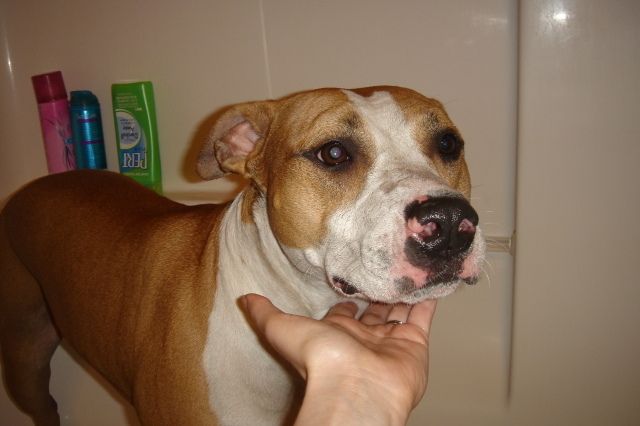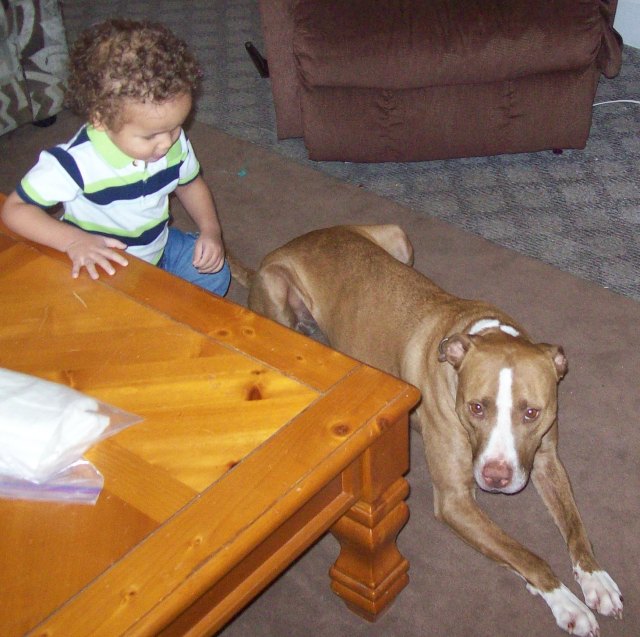Question-------------------------
Followup To I just want to refresh all of this, if we can. Some things that I can buy over the counter for Akita's problem is oatemeal shampoo and what else now?? I want to do as much as I can at home in hopes that it might help her. She will not let me use a blow dryer and shocks or a cone. I have been washing her feet off everything she comes in from out side. I also have been using peroxide but nothing seems to be helping her.I will ask my vet to run tests for fugus, bacteria and parasites. You mentioned predinsone. Can I buy any of this over the counter? Also you mentioned the thyroid in Akita's. I will being that too the vets attention also. I will also buy some black tea. Can I buy any kind of powders that will help dry up under the pads. Something that will not make he sick if she licks? I will buy witch hazel and aloe vera I'm not sure what the petkin relief stick is but I will buy it!Also can i buy the omega 3 amd omega 6 fatty acids over the counter at the drug store. Does she take these with the inflammatory pills that she is taking now?
If there is anything that I can get to keep her feet dryer, that would be good because she just is not letting me dry her feet with anything.
Thanks again for all you help.
Valerie
Thanks again
Valerie
Question -
-------------------------
Followup To
Question -
Hello, My name is Valerie and I have an Akita dog. She is one year old and I got her as a little baby. I noticed about a month ago that she was chewing on her back left paw. I thought she possible had something in her foot so I looked and seen nothing. I kept watching her and then finally took her into a vet that I do not know, I just selected a vet out of the phone book because Akita has never had the need to go to a vet. I have never had to take her to a vet yet in her life. The vet looked at Akita's paw and said she could see anything foreign in her paw. She said she did see a little growth,bump or something but did not say much about it. She said that Akita could possibly have allergies. She gave her some inflammatory pill and told me to check back with her in a week if things were not better. I have noticed that Akita is now chewing on her front paw but not as much as the back. I am so worried about my dog. I love her very much. Her paw is all red and swallon and I don't know what to do and where to go. The vet told me to keep her feet clean and dry and put peroxide on her feet. She said to try an not let Akita lick her feet. Please help me. Akita just keeps chewing on her paws and really gets inside of them and chews and digs on them. She mostly chews on the back one still. Thank you,
Valerie
Answer -
Hi Valerie,
I understand your concern and know how hard it is to watch a pet suffer with such violent itching!
The most common cause for the itch you describe is "Atopic Dermatitis", or inhalant allergy. This is similar to hay fever in humans except that in dogs, the result is usually foot-chewing rather than sneezing.
Allergens can include dust and dust mites; pollens from trees, weeds, grasses and other plants; molds; mildew; animal or human dander, including wool; and insects. Usually more than one substance is involved.
Food allergy also has to be considered because it can cause the same signs as Atopic Dermatitis. You can see, with so many potential causes, it's hard to treat dog allergies.
Allergies can cause constant licking and swelling of the paws and accumulation of debris, creating a moist, warm environment that can cause an overgrowth of bacteria, yeasts, fungi and demodectic mites. Chewing and superficial infection allow deeper penetration of these organisms into the skin, creating a very itchy, and hard to break cycle.
The problem is really two fold: If the suspected allergy is treated but not the skin infection, it is unlikely that your dog would have complete or lasting results.
So you see, because your dog is chewing at her paws, she's at risk for developing secondary infections on her skin, which can quickly get out of hand. That is why your vet told you to keep your dog's feet clean, and why you should strictly follow that advice.
Gently wash your dog's feet with peroxide, at least once a day. Dry your dog's feet very well. If your dog will allow it, a hair drier on the low setting would work well. If it's possible, wash your dog's feet when she comes in from outside too, since grass or pollens might be aggravating or causing the itch.
If you can't wash your dog's feet each time she comes in from being outside, simply soaking her feet for 5 or 10 minutes, four times a day, in cool water can help control licking. For additional relief, add a sprinkling of Epsom salts to the water (1 teaspoon in 2 cups of warm water). Again, it's really important that you dry the dog's feet well after a soak.
Your vet asked that you get back to her in a week, you need to do that if you haven't done so. Treatment for an allergy is a long term and complicated thing, it might take months to get it under control, and the first course of treatment might not work, so other medications would be needed.
Since the problem is continuing, your vet may want to run tests for fungus, bacteria, or parasites, or take a skin scraping sample. In addition, she may prescribe medications such as steroids (Prednisone) which quickly relieve irritation and break the "lick cycle."
These drugs have the added benefit of putting the brakes on the immune system, which produces the allergy symptoms. Finally, pets with severe allergies may undergo a series of shots to help desensitize them to whatever they are allergic to.
In some cases, the vet simply isn't able to find anything physically wrong, but can still treat for the symptoms.
Akita dogs are prone to developing thyroid problems (both hypothyroid and auto-immune thyroiditis), immune diseases like VKH and Pemphigus, skin problems. You should bring this to your vet's attention, since she may not be familar with the breed. Knowing what conditions the breed is subject to, might call for some specific tests to help diagnose your dog.
Aside from the medication your vet prescribes, the following suggestions might help control the itching, but these are not a substitute for vet care, and you should tell your vet exactly what supplements or over the counter remedies you are using on your dog.
Along with washing your dog's feet with peroxide (which is important that you do), also try this:
Brew a cup of tea as you normally would (regular black tea, that you can drink), then soak a clean towel in the cooled tea to make a compress and apply it directly to your dog's paw for three to five minutes, up to five times a day. Tea can discolor fur, so don't be surprised if your pet seems to be wearing socks when you are done. Tea contains chemicals called "Tannins", which help dry rashes and ease irritated skin. Dry the paws well when you're done- with a hair drier if possible.
100% pure Aloe Vera gel (not a blend!) can be applied directly on the paws. Aloe Vera gel comes from the Aloe Vera succulent plant and contains enzymes which break down inflammatory proteins and enhance healing. It really stops itching, and you can use it on yourself too. If you happen to own a plant, just crack off a piece and rub it onto your dog's paws. You can use Aloe Vera gel 4-5 times a day and after cleaning or soaking the paws, or whenever you see your dog chewing at her feet. It's safe if your dog licks it.
You can get pure Aloe Vera gel from health food stores, and I've seen it at Walmart
Dabbing Witch Hazel on the paws with a clean cotton ball, can also help relieve the itch. It's good for all kinds of inflammatory conditions of the skin. It penetrates the skin, killing bacteria and preventing infection, and also soothes inflamed skin. If it seems to sting your dog's raw paws, mix 4 tablespoons of Witch Hazel in 2 cups of water, after soaking or washing the paws dab some on. Don't rinse it off. You can use Witch Hazel 4-5 times a day and after cleaning or soaking the paws. You can get Witch Hazel at most drug stores.
Petkin Relief Stick comes packaged like a stick deodorant. It contains natural ingredients to cool the skin as well as reduce redness and swelling and promote healing. It is safe if your dog licks it, and it's non-stinging. You can find this item at larger pet stores, such as PetSmart.
I suggest giving your dog anti-inflammatorily such as omega-3 and omega-6 fatty acids. These "essential" fatty acids help 10-25% of dogs with allergies. You need to give this supplement daily, and you might not see any results for the first month or two, so you have to use fatty acids along with medications to give your dog relief. When you talk to your vet, also ask about the addition of Omega 3&6 fatty acids to your dog's diet, and the for correct dosage.
Over the counter antihistamines, such as Benadryl can provide complete or at least some relief for many dogs, especially when used in combination with omega-3 fatty acid supplements. The dose of Benadryl is based on your dog's weight, so check with your veterinarian, she can tell you how much Benadryl you can give and how often. Depending on the size of your dog, you may be able to give it twice a day. Antihistamines may cause drowsiness in some dogs.
Be sure to keep your dog's toenails cut short since long, or twisted toenails can be the root source of paw licking.
If your dog will allow it, put plain white cotton socks on her paws, but don't be too surprised if she takes the sock off. If you can prevent her from chewing at her feet for even 15 minutes, it's still 15 minutes of rest so that the cleanings and medications can begin to work.
Sometimes it helps if you clean and medicate the paws, put on the socks, and then take the dog right out for a walk (on a leash). By the time you come back from the walk the dog might be less inclined to pick at the socks.
I hope I've been a help.
Best of luck,
Patti
Thank you so much for the advice. I will do exactly as you say. My dog is my best friend and I love her very much. I hope she starts feeling better. Once again, thank you very much.
Valerie
Answer -
Hi Valerie,
No need to thank me (but you're welsome!) It's more important that you follow the vet's advice, than mine!
Be patient, it takes time for these kind of things to clear up.
Regards,
Patti
AnswerHi Valerie,
Prednisone has to be prescribed by the vet, it's not available over the counter. It's actually a pretty powerful drug, which though effective, should be used to get the itching under control, and then it's use tapered off. To use Prednisone, or any of the corticosteroid medications long term, could mean harmful side effects. Discuss their use, and any concerns you have about the drug with your vet.
I wouldn't use any medicated powders that will help dry
up under the pads, unless it was made especially for use on dogs. Using tea to soak your dog's pad's will have a drying action on the sores, and the Aloe Vera gel will also be a help, but they do take time to work.
The large cone shaped collar will stop your dog from chewing on her feet. That's an absolute. It's also an absolute fact that your dog will struggle to remove it, but she won't be able to, so eventually she'd stop struggling.
You have to decide what's best for the dog, just like a parent decides on what's best for a child. The dog doesn't know anything but how annoying the collar is, but the collar isn't actually hurting her. Chewing her feet is hurting he though, and you have to make sure that she's getting the treatment she needs. Allergies are lifelong and that makes it important to think of the long range effects of everything that is done.
I've heard good things about 3V Capsules Omega 3&6 fatty acid (that's the brand). They contain a higher
percentage of the fatty acids than some other brands. Your dog can take the fatty acids along with the prescribed medication, but ask your vet for the correct dose.
Since your dog won't let you use a hair drier on her feet, just dry them really well with a soft clean towel.
The Petkin Relief Stick is available at larger pet stores, such as PetSmart. You can also find it online. Here's just one place to buy it online, it may be cheaper elsewhere:
http://www.1800petmeds.com/pdetail.asp?SK=2725
If you use a shampoo on your dog, you have to carefully dry her well. Warm moist areas are breeding grounds for itchy yeast and bacteria's that she's already suffering with.
If your vet didn't tell you to bathe her, then this might not be a good time to start bathing her. Is she itching else where? Just treat her feet, or ask your vet if bathing her is a good idea, or if what you should be using is an antibiotic or antibacterial shampoo, instead of oatmeal.
Not that it matters, but you never told me what pills your dog is currently taking for the inflammation. Is it Prednisone? The over the counter antihistamine that I told you about can be taken along with Prednisone, but you need to ask your vet for the correct dose.
Since your dog is young, it would be worth considering going to a dermatologist, confirming that allergies
are the problem and trying hypo sensitization (allergy shots). It works about 70% of the time to control the itching and has few side effects compared to medications. This is costly the first year but over time I think it is less costly and more comfortable for the dog, when it works. Knowing that allergies are present and what the allergies are can sometimes allow better planning for medication use
I wish I had an easy solution for your problem. It's frustrating, I know.
You might want to join a free message board online, where you can discuss your dog's condition with other pet owners who are going through the same thing. You can pick up a lot of information and tips from these message boards. Here are a few you might want to consider:
http://forum.dog.com/asp/
http://forums.petfinder.com/
http://messageboards.ivillage.com/iv-ptdogsseriou
Best of luck!
Patti

 Dog breed?
QuestionQUESTION: Hi Nancy,
I am attaching an image of
Dog breed?
QuestionQUESTION: Hi Nancy,
I am attaching an image of
 My very overly protective puppy
Question
Marla :)
Hello! I adopted a four year o
My very overly protective puppy
Question
Marla :)
Hello! I adopted a four year o
 Puppy hates being alone.
Question
Me and Toby
Our jack russel is extremely cuddl
Puppy hates being alone.
Question
Me and Toby
Our jack russel is extremely cuddl
 3yr. old Yorkie with ? OCD behavior
Question
Keelee
We live in S.Central WI & with the chan
3yr. old Yorkie with ? OCD behavior
Question
Keelee
We live in S.Central WI & with the chan
 my older dog is house broken but not
QuestionQUESTION: I got a 9 yr old dog from a shelter a
my older dog is house broken but not
QuestionQUESTION: I got a 9 yr old dog from a shelter a